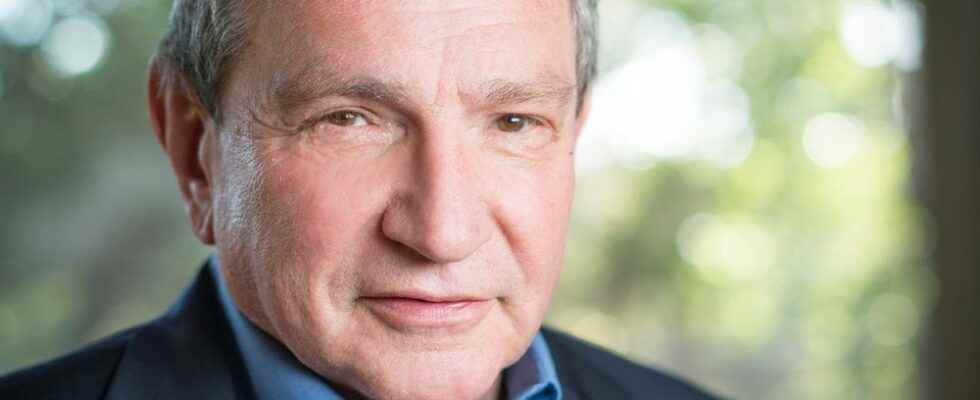READ ALSO >> The first part of our report, where the image and the policy of the President of the Republic seem to seduce Democrats as Republicans. Macron’s love story with the United States began before…
After the baccalaureate, in hypokhâgne and khâgne at the Lycée Henri-IV, in Paris, the student Macron benefits from the immeasurable knowledge of Christian Monjou, who, for three years, teaches him, as well as the rest of the class, the history English and American civilizations. “Emmanuel Macron has always had an American tropism”, testifies the associate professor, who still communicates regularly by SMS with his former student.
“When he left his post at the general secretariat of the Elysée Palace in the summer of 2014, he went to California and called me to ask me for ideas of places to visit, off the beaten track, continues Christian Monjou, I sent it to the Norton Simon Museum of Pasadena.” There, among an extraordinary collection of European and Asian art, the gaze of the future president lingers for a long time on that, unforgettable, of Patience Escalier, an old peasant painted by Van Gogh. “Macron’s fascination for United States rests on two pillars, resumes its former master: new technologies and history, in particular the role of France in American independence, and characters like La Fayette or Rochambeau.
READ ALSO >> “Macron was able to forge a relationship with Trump”
Later, in 2006, aged 29, the future president benefited from the program of the German Marshall Fund, a think tank that selects around fifty future European leaders each year, to introduce them to the United States during a three-week study trip. Objective: to maintain transatlantic links among the future elite of the Old Continent.
Arriving in Washington with another still unknown winner (Najat Vallaud-Belkacem), he stayed there for five days. Then, the group is split into subgroups. That of Emmanuel Macron goes to Houston (Texas), then to Pittsburgh (Pennsylvania) and finally to New York. At each stage, meetings are organized with elected officials, researchers, businessmen or even ordinary Americans. The archives of the German Marshall Fund kept the memory of a participant “very active, charming and curious about everything”.
“American Dream, French Dream”
The Americanophilia of the man who was then an investment banker was not satisfied for all that. In 2012, he was one of the highly motivated candidates for the French-American Foundationanother prestigious program centered on the United States, which counts Alain Minc, Christine Ockrent, or even Bill and Hillary Clinton among its alumni (old students).
But while he is among the ten lucky ones selected, out of 200 candidates, Macron must give up in extremis to fly to Atlanta (Georgia) with the rest of the group: called by François Hollande to the general secretariat of the Elysée, his career politics begins. Never mind… Four years later, in September 2016, he organized one of the very first meetings of his campaign for the presidency at the Paris headquarters of the French-American Foundation. “During the time allotted to him, ten minutes sharp, he made a brilliant presentation on the theme ‘American dream, French dream'”, recalls the director general of the foundation, Christophe Labarde.
It is on this base of intimate knowledge of the country, but also on the friendship that his American counterpart seems to have for him and on the supposed influence that he exerts on the latter, that “Macron the American” establishes his “New Deal” between Paris and Washington. However, fundamental differences remain, of course, particularly on global warming, on the 2015 agreement linked to the Iranian nuclear program, which Trump intends to denounce or amend, not to mention the customs duties on aluminum and steel, which could hit the European Union as early as May 1 if the American moratorium is not renewed.
The honeymoon is peppered with disputes. Only the future will make it possible to measure the reality of Macron’s influence on Trump.
TO KNOW. “France does not count that much…”
Expert in international relations and founder of Geopolitical Futuresan influential center of analysis, George Friedman is not a “macronmaniac”…
What does France represent for the United States?
GF Put yourself in our shoes, we Americans. Currently, we are engaged in discussions with North Korea, we have problems with China. We remain present militarily in Afghanistan, Iraq and elsewhere… I understand that, for France, relations with Washington are essential – the United States is the first power in the world. But the converse is not true. On the contrary, the relative importance of our relationship with Europe has been steadily diminishing for a quarter of a century. Moreover, when we look at this region of the world, we first think of two countries: Germany and the United Kingdom. From our point of view, France is a satellite of Germany. We tend to think that if we have a problem to solve with the French, we should go talk about it… in Berlin! France does not count that much.
Your view of the European Union?
GF The intricacies of European politics are of little interest to us because they do not affect us in any way. If the French imagine that the Americans have a point of view on the EU, they are mistaken. The EU is indifferent to us. When we think of Europe, we think of NATO. And there, the countries that count in our eyes are Russia’s borders, because they make it possible to contain the latter: the Baltic countries, Poland and Romania, all states with which we have excellent relations.
Is France’s fight against terrorism in Africa appreciated?
GF Yes. But, once again, you have to see that, from the American point of view, it is a secondary theater of operations. Most of my compatriots do not even know that a war against terrorism is taking place there, notwithstanding the presence of American forces in Mali, Niger or Somalia.
Political scientist George Friedman, founder of Geopolitical Futures, in 2018.
GF
From our special correspondent, Axel Gyldén
